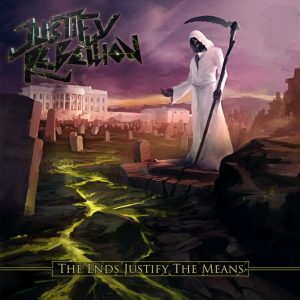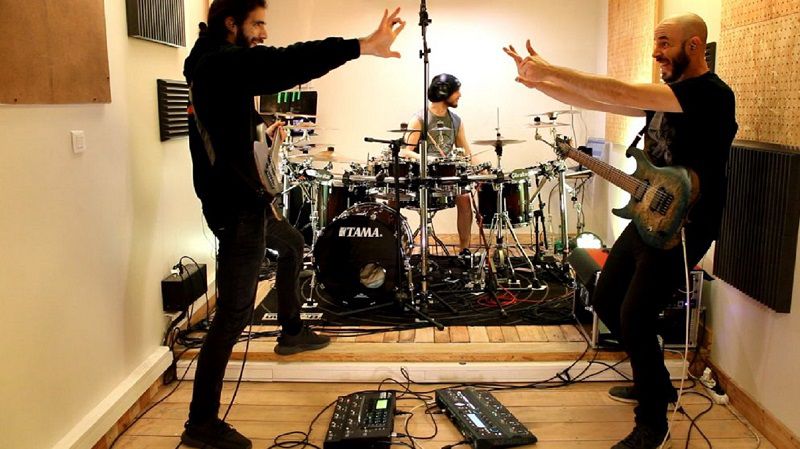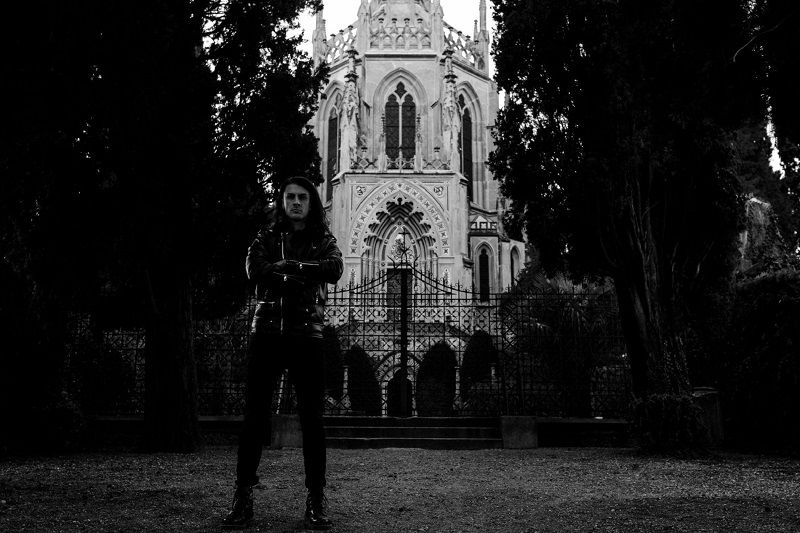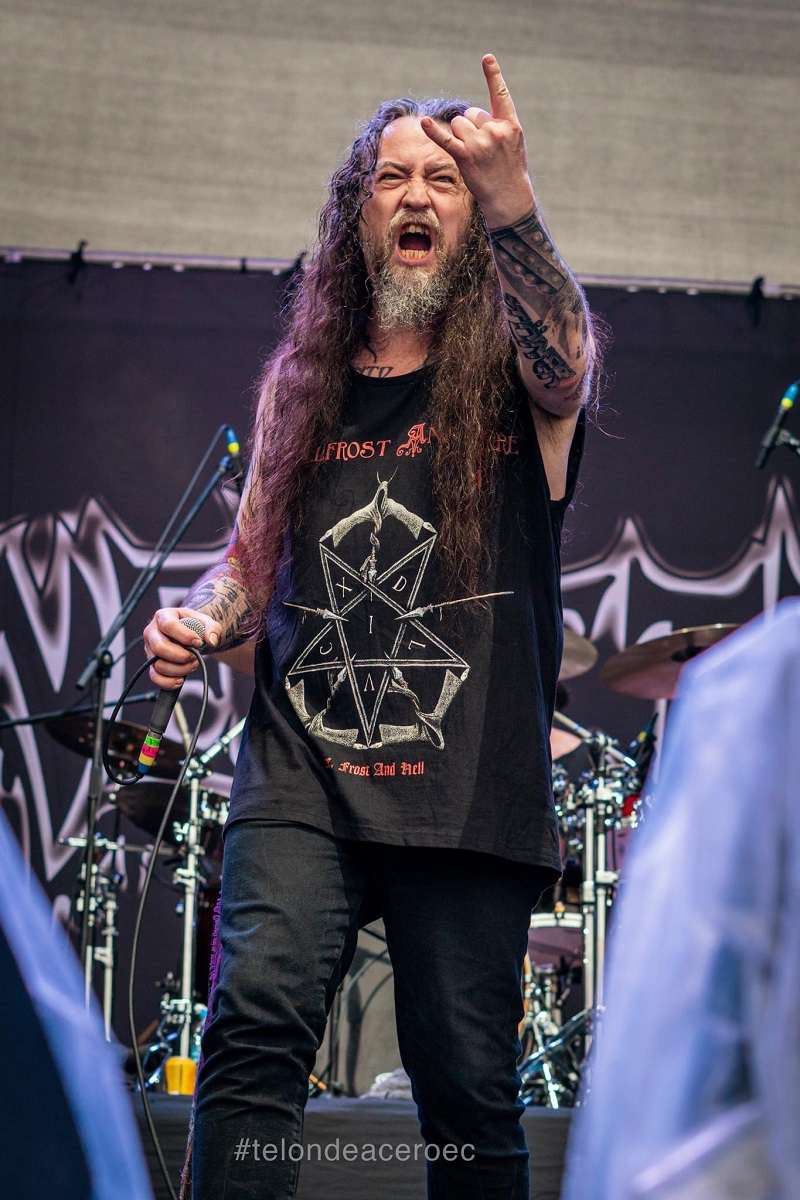Justify Rebellion Interview
9 min read
Some truly dynamic metal musicians have emerged from the Danish underground. Thrash legends like Lars Ulrich, Artillery and guitarist extraordinaire Soren Andersen are some who quickly come to mind as having lasting careers that have thrived locally, nationally and internationally.
A young band poised for “future classic” status is Justify Rebellion, a powerful quartet who successfully blend thrash and the new wave of British heavy metal on their sophomore album, The Ends Justify The Means, which will be released on March 27 via Mighty Music. The album continues the tradition established by the thrash sounds of the early 1980s while also finding a way to break some new ground.
The band uses political turmoil as their go-to topic, but they also change it up by focusing on lore and tales of inner strife and strength. I caught up with three-quarters of Justify Rebellion—Lukas Rautenberg (vocals/guitars), Nikolaj Ross (drums) and Nikolaj Madsen (lead guitarist)—to discuss the themes behind Ends and their metal philosophies. I also had to know if there is something special in the Danish water that helps grow thrash musicians.
Justin Smulison: What are the difficulties or challenges in trying to honor a “classic metal” sound while trying to put your own stamp on it?
Rautenberg and Ross: You’re absolutely right…it’s difficult to make something that hasn’t been done before. The classic sound and vibe is not hard for us to produce but we are always struggling with getting our own stamp on the music. We are trying to make different breaks and BPM changes throughout a composition in order to keep it exciting and maybe that’s what we’d like to say is our ‘stamp’ for the time being. With that said, we are still trying to find a more exact ‘Justify Rebellion sound.’
There are some seemingly obvious influences in this album (like early Metallica) but what are some other, less obvious influences?
R and R: We all have the same music taste but with completely different choices. Some of the artists are Defecto, Judas Priest, Slayer, Dream Theater, Tool, Iron Maiden, and Bullet for My Valentine.
Metal is a genre that never goes away and always seems to find a resurgence. Would you agree and how do you feel you contribute to its longevity?
R and R: As Tenacious D once said: ‘You can’t kill the metal, the metal will live on.’ We couldn’t agree more. One of our goals is to attract more people to the heavy metal family by giving people an experience and a show they’ll remember for the rest of their lives.
Denmark has produced some truly fantastic and significant metal bands, like Artillery. Why do you think so much great metal comes from Denmark?
R and R: Denmark is a country [is full] of entrepreneurs and we’d like to think that there might be a connection with that. But to be honest, we don’t really know. Maybe big idols like Lars Ulrich, Mercyful Fate and Volbeat inspire.
Blessed Altar Zine often covers international underground metal artists and to chronicle bands’ early experiences. How long did you perform as a local band before you were signed?
R and R: The band was formed back in 2014 and got signed in 2017. The first three years was about finding out what music we wanted to play and what skills we had. We barely played live concerts until the summer of 2017, where we attended the Emergenza Festival and were discovered by Mighty Music. [Writer’s Note—The Emergenza Festival considers itself “the world’s largest festival for unsigned bands.]
What lessons did you learn along the way?
R and R: It’s all about playing live. You can be a band with great music and flawless techniques but if no one knows you, it doesn’t mean anything. It is important to perform and make people aware of your existence. Your performance will get better the more you play on the stage. That’s pretty much a raw explanation of how to make a name for yourself.
 Let’s talk about The Ends Justify The Means. It clocks in at just under 40 minutes, and following the brief instrumental opening track, the following eight songs are a full-on metal attack featuring a potent blend of thrash and classic metal, highlighted by doses of melody.
Let’s talk about The Ends Justify The Means. It clocks in at just under 40 minutes, and following the brief instrumental opening track, the following eight songs are a full-on metal attack featuring a potent blend of thrash and classic metal, highlighted by doses of melody.
“Crowd Control” is an example of an aggressive tune with empowering lyrics that also convey a sense of warning. What approaches do you use to marry explosive music with lyrics that are not entirely negative?
Nikolaj Madsen: On “Crowd Control” we wanted to make a heavy metal boogie entry to the album, as it was the first song we wrote for it. When it was almost done, it came down to the title of the song…We ended up calling it “Crowd Control” which is a reference to the idea that we are all getting controlled by something bigger—in a bad way. I wouldn’t say that the lyrics are not negative. It should inspire the listener to break the chains of this crowd control or mind control we are exposed to. It definitely tells the listener to be somewhat cautious of how they live and how they are controlled by bigger powers out there.
“Bringer of War” has a wonderful instrumental and solo section that lasts for at least two minutes after the three-minute mark. How many ideas did you try before you settled on the final mix?
R and R: The melody in that part you are referring to came pretty naturally to us. Nikolaj Madsen had this idea inside his head for a long time and when he presented it to us we all felt the vibe. The solo right before the chorus is actually improvised in the studio when we were recording.
One of my favorite songs is “Salvation,” which features an introductory bass lead that establishes the main theme. It certainly helps the track stand out. How did you know that was the song for bassist Stephen Andersen to get a bit of the spotlight?
R and R: We’ve been wanting to implement specific bass lines into our music since Unleashing the Beast. With ‘Salvation’ it came naturally, maybe because Stephen listened to a lot of Tool [while] we wrote the song.
“Throne of Greed” is a great closer. What was the writing process for that song and how did the song evolve over time?
R and R: Thank you! We said to ourselves before writing this song: ‘Let’s not worry about how long the song is and let’s just write until we think it’s done.’ We wanted to remove all personal boundaries of how to write a song without paying attention to length and structure.
Every musician’s philosophy will differ, but what do you feel makes a good or lasting metal song?
R and R: There are many different aspects to what makes a good or lasting metal song but a great hook and a catchy melody in the chorus can never fail.
Are there emotions that you feel metal can portray accurately, or best?
NM: It would probably be stupid to say that only metal can portray this and that emotion or inner feelings, but I do believe that heavy metal can make the listener feel themselves and their emotions in a stronger way than for example other genres of music. When you feel something so much that you just have to scream it out from the deepest pit of your lungs, I would say that metal is a good place to start. Thereby not saying that you can’t portray feelings and emotions in other genres of music. A lot of pop songs centers around love-based topics. It has always been that way and it probably always will be.
But for me and us in Justify Rebellion, portraying things as love is also relevant for our heavy metal. “The Core” from Unleashing The Beast depicts love as a valuable lesson in life that can turn into hate if you are not aware of what you are doing or what’s happening around you. “Prisoner In Time” on the other hand, depicts the way some people live, where they choose work over loved ones—whether that is one’s partner, social life or family.

What do you hope listeners will feel or take away after listening to Ends from start to finish?
R and R: That this album could have been a 1980s classic if it was made 40 years ago and that it’s an album worth returning to many years later. We hope to give people a feeling of something–it could be joy, happiness or even sadness and anger. If we can make people feel something, we’ve made a worthy record.
You seem like a very socio-politically aware group of writers. How do topics like corruption, political unrest, and even climate change make their way into your songs?
NM: In the last couple of years, while we as a band have grown up from kids to men, we’ve experienced that a lot of political stuff has been going on. As there has always been, I guess. These topics might not always come through clearly in our lyrics, but those thoughts and the idea of political unrest are often the starting points to our lyrics when we are to write them. Then the lyrics will move somewhere. Whether the song is about the political leaders through centuries depicted as the devil himself in the song “The Bringer Of War” or the climate change as “Salvation” depicts—in some way—it all comes down to what we see around us as a politically aware group.
How would you characterize “Throne of Greed?”
NM: On “Throne of Greed” we wanted to make a second part to “Ancient Pharaoh” from Unleashing The Beast. Where “Ancient Pharaoh” is about the pharaoh that gets overruled by his slaves, “Throne of Greed” is about the slave who becomes the pharaoh and is not able to handle his newly gained powers and responsibilities. Therefore he ends up becoming what the slaves (his own people) have already tried to destroy as the chorus states: “Cast your shadows across the sea, you’ve become what you wanted to kill, burn your cities in poverty…”
So, “Throne of Greed” is actually about the idea of a normal person without a political job or title who ends up having all the power of a political leader. He is not able to control his powers though which is too bad since he now thinks that he is “above the gods” the greedy leader he now has become.
Since you are still a relatively new band in the grand scheme of things, what are some musical or topical directions you could take while maintaining true to the sound you are establishing?
NM: While political topics are our go to-thing to write songs about we also like to base our songs around old myths and tales. Songs that don’t always have a message but rather an adventurous story to tell.
For the third album, we could go that way, but we could also write more stuff about the smaller things in the wide spectrum of the world and its problems out there. I think we need to explore topics such as self-realization and inner demons a little more than we’ve done before. So it would probably be a good mixture of political topics, inner demon-topics and adventurous stories that will be the main focus of the third album, like “The Ends Justify The Means”.
We can’t wait to hear what people think about it. We’ve turned things up quite a bit with this album. Now we just have to go out there and kick some ball with it.
Interview by Justin Smulison
Band
Bandcamp
Website
Youtube
Facebook
Spotify
Instagram
**Please support the underground! It’s vital to the future of our genre.**
#WeAreBlessedAltarZine
#TheZineSupportingTheUnderground



